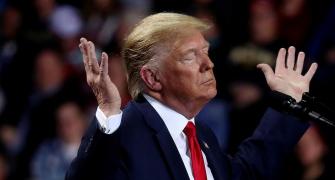With just hours to go before MPs cast their votes in the trust vote in the Lok Sabha, there is only one thing in the minds of both sides -- Cross voting.
Though both fronts know what their numbers are on paper, there is no saying which way an individual may go.
More than any earlier trust vote, the fear of cross-voting looms large over the current vote due to two reasons. First is the motive. Political managers say that the possibility of cross-voting is huge because many a leader's support base has been wiped out due to the redrawing of constituencies and parties will have to take a re-look at how they will allocate seats. In some cases, entire constituencies have been wiped out or have been reserved, rendering decades of careful nurturing useless.
With the redrawn constituencies, such MPs stand to lose their clout within their parties and might not be given a constituency to contest from.
In such a situation, one of the options they have is to take their loyalty to another party in the hope that their clout in their respective regions will help them in securing a ticket there.
According to Election Commission of India rules, the one clause to curb cross voting is to enable the parties and the House to take action against those going against the whip.
But this time around, the timing of the trust vote has facilitated the MPs to circumvent this clause.
The House action is a long drawn process and elections would be scheduled by the time a decision is taken about the penalty for MPs who defied the party whip.
In the first signs of cracks within parties, Bharatiya Janata Party MP from Dharwad Manjunath Khunnur has come out and said he will vote with the United Progressive Alliance. His constituency has become smaller and also has left his support base fractured. Similar is the case with top cop turned politician H T Sangliana, whose Bangalore north constituency has also suffered. It is said Sanglaina may abstain from voting.
Uttar Pradesh is said to be another state which will see a lot of MPs defying party whips and voting for the other side. With both the Samajwadi Party and the Bahujan Samaj Party going all out to break each other's ranks, the added incentive for the MPs is the assurance of a ticket in the next election.
Rajya Sahba MP Shahid Siddiqi, who changed sides from the SP to the BSP last week, was among the first to predict that there will be a lot of cross voters in this trust vote. When he was still SP General Secretary Siddiqi told rediff.com: "Though we are confident that the UPA will win the trust vote, there is no saying how individuals will vote. This trust vote will see a lot of cross voting.
"Because of the delimitation, a lot of MPs are unhappy. They will want to contest from a rival party ticket if their party junks them.
"Another reason is that action against somebody who defies a whip will take a long time. The committee may take as much as three months for a single hearing. By the time it comes to a conclusion, the House will be dissolved. Nothing can be done against an MP."
As a sign of things to come, already the SP and the BSP are claiming the loyalty of five members from each other's camp.
On Tuesday, SP general secretary Amar Singh said: "We have the support of at least four MPs form outside our parties." Asked if they may be BSP MPs and whether his party is trying to cause defections, he said: "You have said what I wanted to say."







